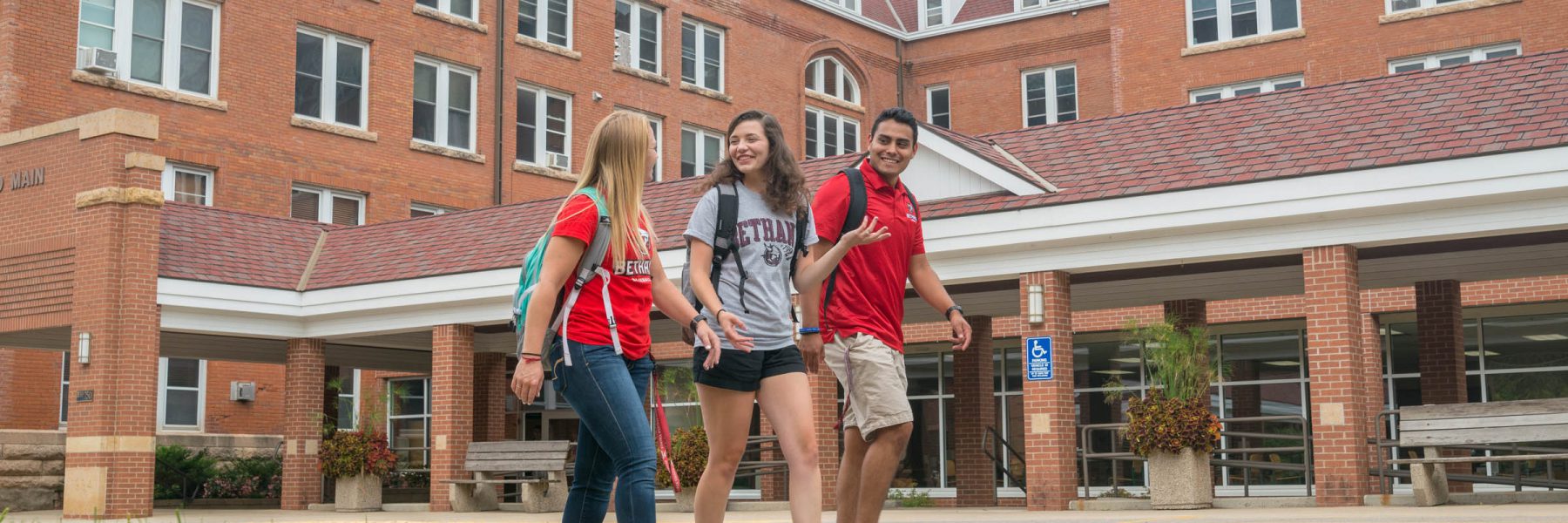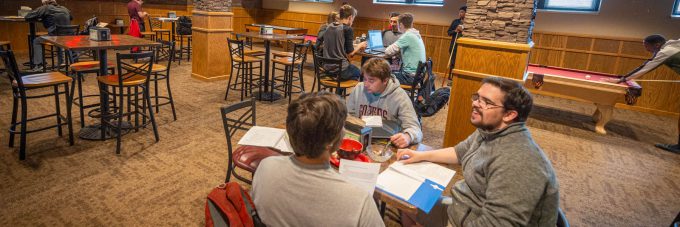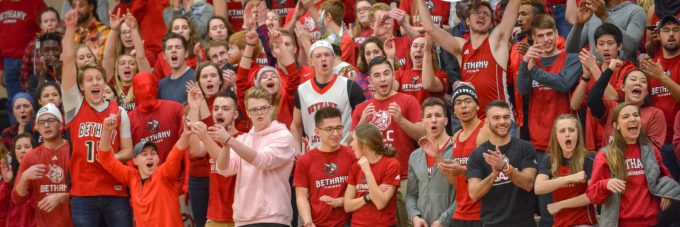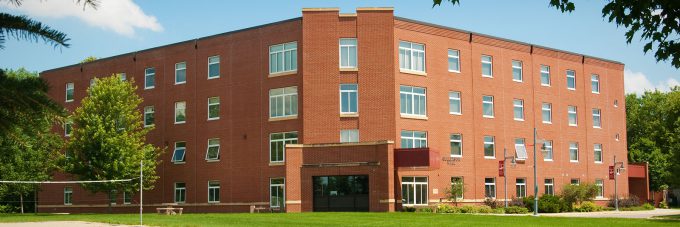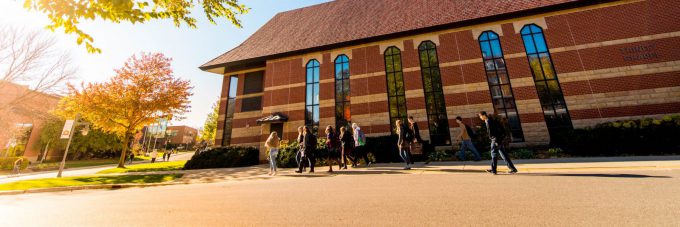General Guidelines
Individuals living in a community are responsible for their behavior as it affects themselves, other individuals, and the community around them. Standards and policies are implemented to safeguard the satisfaction and wellbeing of the individual as well as the entire community. In the Bethany community, those standards and policies are formulated under the following guidelines:
- Federal, state, and local laws.
- College rules and regulations as stated in the Student Guidebook and elsewhere.
- The answer given by Christ, Himself, when asked for the greatest commandment:
“Love the Lord your God with all your heart and with all your soul and with all your mind. This is the first and greatest commandment. And the second is like it: Love your neighbor as yourself. All the Law and the Prophets hang on these two commandments” (Matthew 22:37-40).
Adherence to the first two points above would ensure order. However, the overriding guide in the Bethany community is the third – the law of love, as expressed in the Scriptures. This standard, of the highest degree, is set toward creating an optimal learning and living environment for the Bethany student while equipping him/her for a life of love and service to the larger community.
In any instance, Bethany students will be expected to evaluate their actions and decisions in the light of such questions as:
- Does this glorify God?
- Does this benefit my neighbor?
- Are my actions in accordance with God’s loving will as revealed in the Holy Scriptures?
- Has this or will this harm myself or others?
Students are expected to conduct themselves in accordance with the Standards of Conduct as found in the Student Guidebook, and not live in blatant disregard for the moral principles of the College or publicly promote views which are contrary to the College’s beliefs as directed by our governing church body, the Evangelical Lutheran Synod.
Guidance from God’s Word
As a Christian college, we strive to put into practice the teachings of our Lord Jesus Christ, which He has given through God’s Word, the Bible. Our Savior, who has purchased our entrance into heaven, has instructed us, “If you continue in My Word, then you are truly My disciples; then you will know the truth, and the truth shall set you free” (John 8:31-32).
Due to the weakness of our sinful nature, all of us struggle daily with temptations to live contrary to God’s Word. We recognize our own failings and seek His wonderful forgiveness in Christ. When someone is caught up in any sin, it is our aim to address the situation gently and with patience, using God’s Word as our guide. The College will offer counsel and assistance to encourage and support the individual’s resolve to live consistently with these guidelines.
Standards of Conduct
The Standards of Conduct at Bethany Lutheran College are intended to protect the interest of the Bethany community and provide a safe and productive environment for all. These standards apply to all students. Every student bears responsibility for his or her actions and assumes reasonable responsibility for the behavior of their guests. Bethany encourages all members of the campus community to hold each other accountable for their actions by addressing and reporting incidents that violate the Standards of Conduct. Academic dishonesty falls under the Academic Honor Code and can be found in the Academic Catalog.
The following is a list of misconduct or activities that are considered to be violations of Bethany’s Standards of Conduct and/or municipal, state, and federal regulations. Prohibited conduct also includes conduct engaged in by electronic means, including, but not limited to, computers (such as with use of the Internet for email or social media purposes), any type of phone (such as by calls, texts, instant messaging, or the Internet), or any other means of electronic communication. These provisions should not be construed, and will not be enacted, to deny any student any rights protected by the United States and/or Minnesota Constitution:
- Intentionally or recklessly causing physical or emotional harm to any person.
- Disruptive behavior that interferes with the personal or academic activities of others or the College and its mission.
- Any form of hazing. Hazing includes activities that endangers the mental or physical health or safety of an individual or destroys property, for the purpose of initiation, admission, or membership in a group or organization.
- The possession, use, or being in the presence of alcohol on campus. See Alcohol/Drug Policy.
- The illegal use, possession, distribution, or sale of alcohol off campus. see Alcohol/Drug Policy.
- The illegal possession, use, manufacture, cultivation, sale, or distribution of any counterfeit, illegal, dangerous, “designer,” or controlled drug or other substance or drug paraphernalia on or off campus, or being in the presence of such actions. This includes prescription medications when used outside of the manner in which prescribed. See Alcohol/Drug Policy.
- The possession, use, manufacture, cultivation, sale, or distribution of any substances not necessarily considered illegal but are used to alter one’s personality, behavior, or physical or emotional state. (e.g. marijuana & THC). See Alcohol/Drug Policy.
NOTE: Medically recommended cannabis or marijuana is not recognized by federal law or by the College as a legal prescription. Therefore, possession of marijuana on campus for any reason is strictly prohibited. This includes vaporizer pen or e-cigarette accessories know to contain THC, “wax”, or any other form of marijuana extract. - The use of tobacco in all its forms (including e-cigarettes and vaping devices), in keeping with federal, state, and local laws, is not permitted on the campus except in designated use areas. See Smoke-, Vape-, and Tobacco-Free Buildings.
- Engaging in residence hall raids.
- Violating residence hall visitation hours.
- Entering any unauthorized area without appropriate permission (i.e. all roofs, maintenance shop, locked buildings, and rooms).
- Tampering with any security system including, but not limited to, building exits, locks, surveillance, corridors, altering or propping open any locked exit doors, or propping open any exterior windows other than those in student rooms.
- Unauthorized possession, use, or duplication of College keys or FOBs.
- Theft of property or services, including but not limited to, withholding information about stolen property, possessing property known to be stolen, or taking property of another without consent, even with an intent to return the property.
- Intentionally destroying or defacing College or private property.
- Violation of local, state, federal, or campus fire policies including, but not limited to:
- Intentionally, or recklessly, causing a fire, which damages College or personal property;
- failure to evacuate a College-owned building during a fire alarm;
- improper use of College Safety Equipment; or
- tampering with or improperly engaging a fire alarm or fire detection equipment while on College property.
- Unauthorized possession, use, or storage of any weapon (e.g. firearms, sling shots, bows, arrows, martial arts weapons, knives with a blade four inches or longer, decorative weapons, hatchets, axes, gel blasters, electronic incapacitation devices [EICs] etc.). See also Firearms/Dangerous Articles and Weapons in the Campus Security section.
- Throwing, dropping, or causing any object to fall from a building.
- Threatening or endangering the health or safety of an animal(s).
- Possessing a pet or animal in the residence hall or College-owned property used for campus housing except when required by law.
- Displaying, possessing, or distributing any materials on-campus incongruent with the mission and values of the College, such as, but not limited to: a) Pornographic materials; b) Materials saturated with offensive language; c) Materials deemed to portray bigotry, racism, or sexism.
- Students on roller blades, skateboards, or scooters are permitted to pass through campus utilizing paved areas. Those transiting campus on such devices must not endanger other individuals. Jumping off walls, stairs, railings, or any other hazardous activities are not permitted. The use of these devices is prohibited in any campus building.
- Violating residential life or other campus policies.
- Legal gambling is discouraged. Illegal gambling is prohibited by law.
- Refusing to cooperate with Bethany officials during an investigation of misconduct or violation of Bethany policies.
- Failure to comply with the directions of a Residential Life staff member, College officer, or Security personnel acting in the performance of his/her duties.
- Intentionally initiating or causing any false reports of an emergency.
- Withholding information or acting as an accomplice to any person violating the Standards of Conduct.
- Recklessly and publicly exposing one’s intimate body parts or engaging in public urination, defecation, or sexual acts.
- Materially or substantially interfering with, obstructing, or disrupting a College activity. a) College activities include, but are not limited to, all normal College activities, such as teaching, research, Residential Life activities or programming, meetings, public events, and disciplinary proceedings. College activities also include off-campus College activities and programs. b) This prohibition includes, but is not limited to, interference, obstruction, or disruption of the freedom of expression or movement of students or other members of the College community and their guests.
- Interfering with, obstructing, or disrupting police, fire response, or medical response. This prohibition includes, but is not limited to, resisting arrest and/or failing to abide by the directions of a peace officer and/or paramedics.
- Impersonation of another, using another person’s identity, or providing materially false information to law enforcement or any College official, including manufacturing, use, or possession of false identification. This prohibits use of false identification or the identification of another person to gain entrance to, but not limited to, any facility, building, or the dining hall. This also prohibits forging or altering another person’s signature or any official College document.
- Use of an electronic or other device to make an audio and/or visual recording of another person (including, but not limited to, photographing, videotaping, filming, or audio recording) without the person’s express consent when such recording causes the person to suffer substantial emotional distress and would cause a reasonable person to suffer substantial emotional distress. The storing, sharing, and/or distribution of such records by any mean is also prohibited. See Min. Stat. § 626A.02.
- Sanction Noncompliance. Failing to abide by or complete a College sanction in a satisfactory manner. This includes but is not limited to violating conduct probation.
- Violating College requirements or public health orders in place to reduce the risk of spreading infectious disease. a) Failing to follow any and all applicable federal, state, and/or local public health orders. If multiple orders apply or in the event of conflict between or among them, students are required to follow the most restrictive public health order. b) Failing to follow College policies, procedures, and any other requirements in place to help reduce the risk of contracting or spreading infectious diseases. c) To the extent consistent with College policy, failing to comply with any additional or more specific actions required by a department to limit the spread of infectious disease, while participating in a program or activity, utilizing a service or benefit, or using College facilities.
- Engaging in, inciting, or arming someone for an unlawful assembly or riot. See Appendix 1.
This list is not inclusive of all the standards that will be enforced. Bethany reserves the right to include other standards and regulations for its students that are in agreement or not in conflict with its stated philosophy and objectives. Nothing herein contained shall be deemed a limitation upon the expressed or implied authority or duties of the Board of Regents or the administrative officers of the College.
Sexual Misconduct
Allegations of sexual violence or sexual harassment should be brought under those policies contained in the Sexual Misconduct sections of the Student Guidebook.
Language
In a Christian community each member is expected to honor God and each other in the manner in which they speak to one another and the words used in conversation.
Sexuality
We recognize that human sexuality is a wonderful gift from God, which He has given as a blessing to be used solely inside of marriage. Following the law of Christian love that compels us to love and honor God first and also to respect and love one another as ourselves, we understand that this gift from God is to be reserved for relations between a husband and wife. All abuses of this gift will be dealt with in a spirit of repentance and forgiveness, as the Scriptures instruct.
Clothing
“Whether you eat or drink or whatever you do, do it all for the glory of God” (1 Cor. 10:31). We want to glorify our gracious Lord and Savior for all His loving kindness in every aspect of our lives. In keeping with such an attitude, we dress in such a way that is not offensive to our Savior or others in the Bethany community. We ask that faculty, staff, and students assist each other in how we model Bethany’s message of Christ’s love and our reaction to His love, so that our Christian freedom will not be misinterpreted.
NOTE: Please remember that shoes must be worn in all academic, administrative, and campus food service locations.
Sanctions for Violations of Standards of Conduct
When violations occur, one or more of the following sanctions may be imposed:
- Warning: A warning may be in the form of a verbal or written warning or reprimand.
- Probation: Probation is a status with condition imposed for a defined period of time and includes the probability of more severe disciplinary sanctions if the student is found to violate any institutional regulation during the probationary period.
- Required Compliance: Required compliance means satisfying College requirements, work assignments, community service, or other discretionary assignments.
- Confiscation: Confiscation means confiscation of goods used or possessed in violation of College regulations or confiscation of falsified identification or identification wrongly used.
- Fines: Fines mean monetary payment to the College. For the year of this Guidebook publication, maximum fine amounts will not exceed $200.00 per individual infraction. Fines and fine limits are separate from, and are not to be confused with, restitution (see point 6). Fines must be paid to the Business Office within 14 days from the date and time of issue. Unpaid fines that go beyond the 14-day requirement become delinquent and are added to your college account.
- Restitution: Restitution means making compensation for loss, injury, or damage.
- Restriction of Privileges*: Restriction of privileges means the denial, removal, or restriction of specified privileges.
- Housing Suspension or Expulsion*: Housing suspension means separation of the student from campus housing for a defined period of time. Housing expulsion means permanent separation of the student from campus housing.
- Suspension*: Suspension means separation of the student from the College for a defined period of time, after which the student is eligible to return to the College. Suspension may include conditions for readmission. The absence is unexcused.
- Expulsion*: Expulsion means the permanent separation of the student from the College.
- Withholding of Diploma or Degree: Withholding of diploma or degree means the withholding of diploma or degree otherwise earned for a defined period of time or until the completion of assigned sanctions.
- Revocation of Admission or Degree: Revocation of admission or degree means revoking a student admission to the College or revoking a degree already awarded by the College.
*Tuition, room, and other fees will not be refunded and scholarships may be terminated for students suspended or dismissed for academic or conduct reasons during the semester. Board plans may be refunded on a prorated basis.
Sanctioning actions may also include communication with parents and/or referral for mandatory counseling as deemed appropriate by the College. The College has identified Standard Sanctions for Substance and Alcohol Abuse Related Violations.
The Dean of Students may convene a Dean’s Advisory Committee to assist in determining level of responsibility and/or sanctions. Criminal behavior may also be referred to the police department for investigation.
Appeal Procedure
A student has the right to appeal the decision of a standard of conduct determination or sanction. Students can submit an appeal in writing to the Manager of Human Resources within five (5) business days of the pronounced sanction. Grounds for an appeal include: presentation of new evidence, concerns about procedural errors and/or an unfair investigation, or concerns about the severity of the sanction(s). The student must specifically communicate how a decision may have been made differently in light of the information provided within the appeal. The appeal will only be reviewed if these conditions are satisfactorily met.
Upon receipt of an appeal, the Manager of Human Resources will forward the appeal to a reviewer (at the vice president level) who was not involved in the original decision. The reviewer(s) may consider all records and information collected in determining the decision, as well as collect any other information determined to be beneficial.
In addition, the reviewer(s) may request an advisory committee to assist in the decision making process by contacting the Manager of Human Resources who will assemble a panel of faculty and/or staff members from the campus community. After consideration of the appeal, the panel may decide to recommend any of the following:
- Accept the original determination/sanction.
- Refer the case back to the original decision maker to consider new evidence.
- Reverse the original determination/sanction and dismiss the case entirely.
- Accept the original determination, but reduce the sanction.
Upon review of the file and consideration of the advisory committee’s findings and recommendations (if such committee is appointed), the reviewer will render a decision and notify the student in a timely manner. A copy will be sent to the Dean of Students. The appeal decision shall be final.
The Judiciary Process and the Law
Students should be aware that misconduct may subject them to penalties prescribed by municipal, state, or federal law. Bethany does not consider a college campus to be a sanctuary from public law and may report infractions of municipal, state, or federal law to the proper authorities. The imposition of penalties by courts of law does not constitute double jeopardy, inasmuch as college punishment is not criminal in nature. The Dean of Students may take disciplinary action toward a student who is charged with or guilty of a criminal offense. Criminal charges or court decisions do not limit the College in taking disciplinary actions for violations of campus regulations.
Complaints
If a student feels that he/she has been treated in an unfair manner, he/she may appeal a disciplinary decision per the Appeal Procedure, file a grievance per the Grievance Policy, or submit a formal written complaint. Formal written complaints must be submitted to the College officer with the responsibility to handle the complaint. BLC shares information about non-trivial formal complaints with its accreditor, the Higher Learning Commission. Individual identities are shielded in these reports.
Grievance Policy (abbreviated)
Bethany Lutheran College’s policies and practices are designed to create optimal work and learning environments for its employees and students. When the occasion arises where an employee or student feels that he/she has been illegally discriminated against and where the issue (e.g., sexual harassment) is not addressed elsewhere in the Faculty Handbook, Administrative and Staff Handbook, or Student Guidebook, the employee or student may use the grievance process to seek resolution of the issue.
The grievance process is restricted to complaints of discrimination as outlined in federal anti-discrimination statutes, state and local laws against discrimination, and College anti-discrimination policies, except where allowed by Bethany’s status as a religious institution.
This grievance process is internal to the College and applies to incidents that take place at the College and its affiliated off-site activities or that are related to College operations. Individuals who may use this grievance process are limited to current students and employees.
The College is committed to resolving complaints of discrimination in a timely manner. Students, faculty, and staff are expected to cooperate fully and in a timely way with all investigations into complaints of discrimination. Failure to do so may result in disciplinary action.
Employees and students are not to be penalized or retaliated against for proper use of the grievance process. However, it is not considered proper if an employee or student abuses the process by raising grievances in bad faith or solely for the purposes of delay or harassment, or by repeatedly raising grievances that a reasonable person would judge as having no merit.
The College encourages students and employees to use the internal grievance process. However, employees have the right to file a complaint with the Equal Employment Opportunity Commission (EEOC), and students have the right to file a complaint with the Office for Civil Rights (OCR), U.S. Department of Education, without first using the College’s internal grievance process.
Individuals who feel they have been illegally discriminated against may use the grievance process within the following timeframes:
- Employees: within 15 business days of the alleged incident(s)
- Students: within 15 class days of the alleged incident(s)
For purposes of this policy, class days includes finals week. If the alleged incident(s) occurs during the last 15 class days of the academic year, a 15 business-day summer timeframe will be used.
Contact the Human Resources office (507.344.7840) to request, in confidence, a copy of the complete grievance policy and the process to be used for submission and resolution of grievances.
Other Student Guide Sections
Continue your reading with these other sections of the Student Guide.


